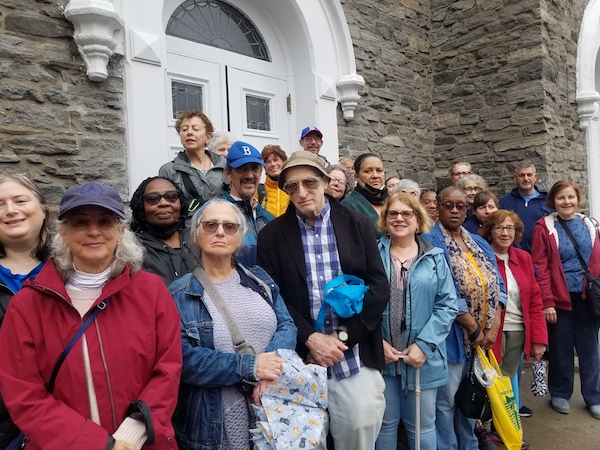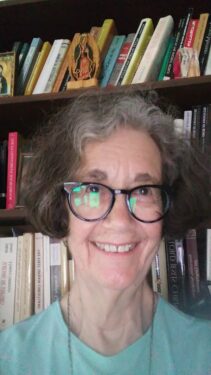
Sister Celia Deutsch has spent a lifetime building bridges between religions
FLATBUSH — Sister Celia Deutsch, N.D.S., grew up steeped in Catholicism thanks to her mother, who sent her to Catholic school and made sure she practiced the faith.
Her father was Jewish, but as it turned out, being raised by parents of two different religions planted a seed in Celia that bore fruit many years later.
“When I was a child, I knew that my father didn’t come to church with us. But I didn’t think anything of it,” she said. “But then, one day at school, the topic of baptism came up. I went home and asked my father about it. He told me he wasn’t baptized because Jews don’t baptize their children.”
That marked the first time she became aware of religious differences.
She has devoted her life to bringing people of different religions together to help them find common ground. Right after graduating high school, she joined the Sisters of Notre Dame of Sion, a religious order whose mission is building bridges to foster a deeper understanding between people of different faiths.
Sister Celia, a research scholar in the Religion Department at Barnard College, lives at Our Lady of Refuge Church in Flatbush. Much of her work these days revolves around the Interfaith Coalition of Brooklyn, a group that includes Our Lady of Refuge, the East Midwood Jewish Center, Temple B’ShERT, the Turkish Cultural Center of Brooklyn, and the Episcopal Church of the Nativity — representing the Catholic, Jewish, Muslim and Episcopal faiths.
The coalition, under the direction of Sister Celia and her co-coordinator, Sally Hipscher, a member of the East Midwood Jewish Center, sponsors gatherings designed to bring people together in the spirit of cooperation. The group recently held its 22nd Annual Interfaith Thanksgiving Service at the Episcopal Church of the Nativity.
“It’s always wonderful because we all get together as people of faith to share a common experience,” she said.
Other programs include an annual walking tour of historic buildings in Flatbush, and Abraham’s Table, a lecture series in which a speaker will discuss a topic aimed at explaining how the different faiths celebrate milestone events, such as the birth of a child.
The coalition’s work is taking place amid a backdrop of a dramatic increase in anti-Semitic hate crimes in New York City.
According to the NYPD, anti-Semitic hate crimes rose 125% this November compared to November 2021. There were 45 of these crimes reported last month. During the same period in 2021, there were 20. There was an even sharper increase in February 2022 over the same month in 2021 — 56 anti-Jewish crimes this February compared to 11 during the same period a year earlier.
“It’s discouraging,” Hipscher said, but quickly added the coalition isn’t going to let the haters win. “We continue to do what we do because we know that change comes from each of us being the change that we want to see. It starts with us.”
And it starts in simple ways, like sharing a meal, Sister Celia said.
“It’s sitting down face-to-face with another person and seeing that they’re not that different from you,” she explained.
As a Catholic with a Jewish father, Sister Deutsch has a unique understanding of religious differences.
She recalled an incident when she was a child growing up in Central Illinois when she asked a question about her father being Jewish in class during a religion lesson.
“I heard one of the boys whisper to one of his friends. ‘She’s a Jew.’ The other kid said, ‘No, she’s okay. She’s Catholic.’ I went home and told my mother a boy called me a Jew, but another defended me,” she recalled. “My mother said, ‘There’s nothing that needs to be defended.’ She said people should be proud of who they are.”
Our Lady of Refuge and the East Midwood Jewish Center are the original members of the coalition, which was founded in the mid-1990s because of an honorary seder.
The pastor of Our Lady of Refuge at the time, Father Andrew Struzzieri, asked Sister Celia if she would be willing to organize a Passover seder in the spirit of promoting religious understanding between Christians and Jews in the Flatbush-Midwood area.
“He had served at St. Matthew’s (located in Crown Heights) when the Crown Heights Riot took place. And he said to me, ‘We can’t let that happen here,’” she recalled.

The Crown Heights Riot took place over three days in August 1991 when tensions between the black and Orthodox Jewish communities boiled over after a car ran over a black child, Gavin Cato, killing him. The car was part of a motorcade for a rabbi. In the aftermath, a Jewish man, Yankel Rosenbaum, was beaten to death. Others were beaten on the streets, Jewish-owned stores were looted, and numerous fires were set.
Sister Celia, who was anxious to ensure that the seder was conducted with the utmost respect for Jewish traditions, found a willing partner in the East Midwood Jewish Center. From that seder, the two neighborhood religious institutions started working together.
Within a few years, they formed the Interfaith Coalition of Brooklyn and eventually invited additional partners — the temple, the Turkish Cultural Center, and the Episcopal Church — to join them and help expand the mission.
“We took on partners because, although we had Muslim neighbors who would come to our events, we never had a real programming partner from the Muslim community from the immediate area here in Midwood and Flatbush,” Hipscher explained.
As a grassroots organization, the Interfaith Coalition of Brooklyn might not solve all of the diocese’s problems, but its work is important because it brings people closer, according to Rabbi Samuel Levine of the East Midwood Jewish Center.
“These kinds of shared religious experiences are incredibly meaningful because it’s actually producing real connections and real friendships,” he said. “And once you break down a barrier in a community, then that kind of goodwill tends to spread.”
